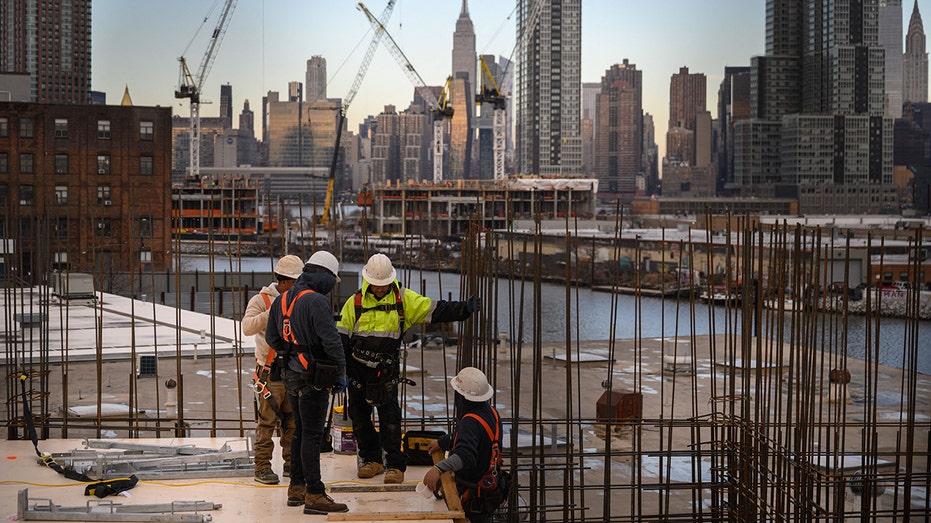House Republicans fear Biden’s executive order boosting labor unions will increase construction costs
Biden's executive order requires the government to use labor agreements for large federal construction projects
House Republicans are eying a pro-union Biden administration regulation in its final stages, which would boost hiring of organized labor for federal construction projects.
In February 2022, President Joe Biden signed Executive Order 14063 requiring the use of project labor agreements for large-scale federal construction projects. The order defines these agreements as a "pre-hire collective bargaining agreement with one or more labor organizations that establishes the terms and conditions of employment for a specific construction project." A large-scale project cost $35 million or more.
In August 2022, the Department of Defense, the General Services Administration and the National Aeronautics and Space Administration issued a draft regulation to implement the executive order.
However, GOP lawmakers contend that this policy will cut most construction firms and workers out from the competitive bidding process for federal projects, raise construction costs for taxpayers and prevent local workers and companies from taking projects in right-to-work states.
AI SET TO TRANSFORM CONSTRUCTION INDUSTRY

Construction workers standing before the Manhattan skyline, in Brooklyn on January 24, 2023. (Photo by Ed JONES / AFP) (Photo by ED JONES/AFP via Getty Images) ((Photo by ED JONES/AFP via Getty Images) / Getty Images)
An average of 119 federal construction projects exceeded $35 million from fiscal years 2019 through 2021, and the average contract was $114 million, according to the Federal Procurement Data System.
Republicans on the House Oversight and Accountability Committee asked the Biden administration officials for a briefing in a May 16 letter.
"This order threatens to raise taxpayer costs, cut non-union workers out of federal projects, and force right-to-work states to freeze local workers out of cooperative federal projects," says the letter from Oversight Chairman James Comer, R-Ky., and signed by 17 other Republican members.
The letter is to Office of Management and Budget Director Shalanda Young, Office of Information and Regulatory Affairs Administrator Richard Revesz, and Office of Federal Procurement Policy Acting Administrator Lesley Field.
The regulatory affairs office informed the committee in March that the Federal Acquisition Regulation "is now in the final rule phase," the letter says.
"We, therefore, request that you provide committee staff a briefing on the draft final rule before the Office of Information and Regulatory Affairs completes review of the draft rule and no later than May 31, 2023," the letter requests.
I'M A 23-YEAR-OLD CONSTRUCTION WORKER WITH A GREAT CAREER AND NO COLLEGE DEBT
House Republicans argued that project labor agreements lead to increases in taxpayer-funded construction costs of up to 20 percent, may reduce opportunities for qualified contractors, and exacerbates the construction industry’s worker shortage.
Among other things, Republicans also asked for documents that would show an analysis of the cost and benefit of project labor agreements or an analysis of the economic impact this would have on the U.S.
The letter from Comer and other Republicans noted that the GOP had first asked for a briefing about the order in June 2022, a time when they were in the House minority and lacked the ability to compel action.
"You did not provide this briefing, but ultimately treated Committee Republicans’ request letter as a public comment," the letter notes.
It later adds, "This briefing should include full information on whether and how our concerns were considered in review of the proposed rule and preparation of the draft final rule as well as how they are being considered now."
Organized labor-affiliated organizations spent $27.6 million in 2020 to help get Biden elected, according to OpenSecrets.org, which tracks money in politics.
Biden’s executive order says that lack of coordination among employers, and uncertainty about the employment of various of workers, "can create friction and disputes in the absence of an agreed-upon resolution mechanism."
GET FOX BUSINESS ON THE GO BY CLICKING HERE
"Project labor agreements are often effective in preventing these problems from developing because they provide structure and stability to large-scale construction projects," the executive order contends. "Such agreements avoid labor-related disruptions on projects by using dispute-resolution processes to resolve worksite disputes and by prohibiting work stoppages, including strikes and lockouts. They secure the commitment of all stakeholders on a construction site that the project will proceed efficiently without unnecessary interruptions."
The OMB, OIRA and the General Services Administration did not respond to inquiries for this story.




















